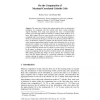Free Online Productivity Tools
i2Speak
i2Symbol
i2OCR
iTex2Img
iWeb2Print
iWeb2Shot
i2Type
iPdf2Split
iPdf2Merge
i2Bopomofo
i2Arabic
i2Style
i2Image
i2PDF
iLatex2Rtf
Sci2ools
DAWAK
2006
Springer
2006
Springer
On the Computation of Maximal-Correlated Cuboids Cells
The main idea of iceberg data cubing methods relies on optimization techniques for computing only the cuboids cells above certain minimum support threshold. Even using such approach the curse of dimensionality remains, given the large number of cuboids to compute, which produces, as we know, huge outputs. However, more recently, some efforts have been done on computing only closed cuboids. Nevertheless, for some of the dense databases, which are considered in this paper, even the set of all closed cuboids will be too large. An alternative would be to compute only the maximal cuboids. However, a pure maximal approaching implies loosing some information, this is one can generate the complete set of cuboids cells from its maximal but without their respective aggregation value. To play with some "loss of information" we need to add an interesting measure, that we call the correlated value of a cuboid cell. In this paper, we propose a new notion for reducing cuboids aggregation by...
| Added | 22 Aug 2010 |
| Updated | 22 Aug 2010 |
| Type | Conference |
| Year | 2006 |
| Where | DAWAK |
| Authors | Ronnie Alves, Orlando Belo |
Comments (0)

